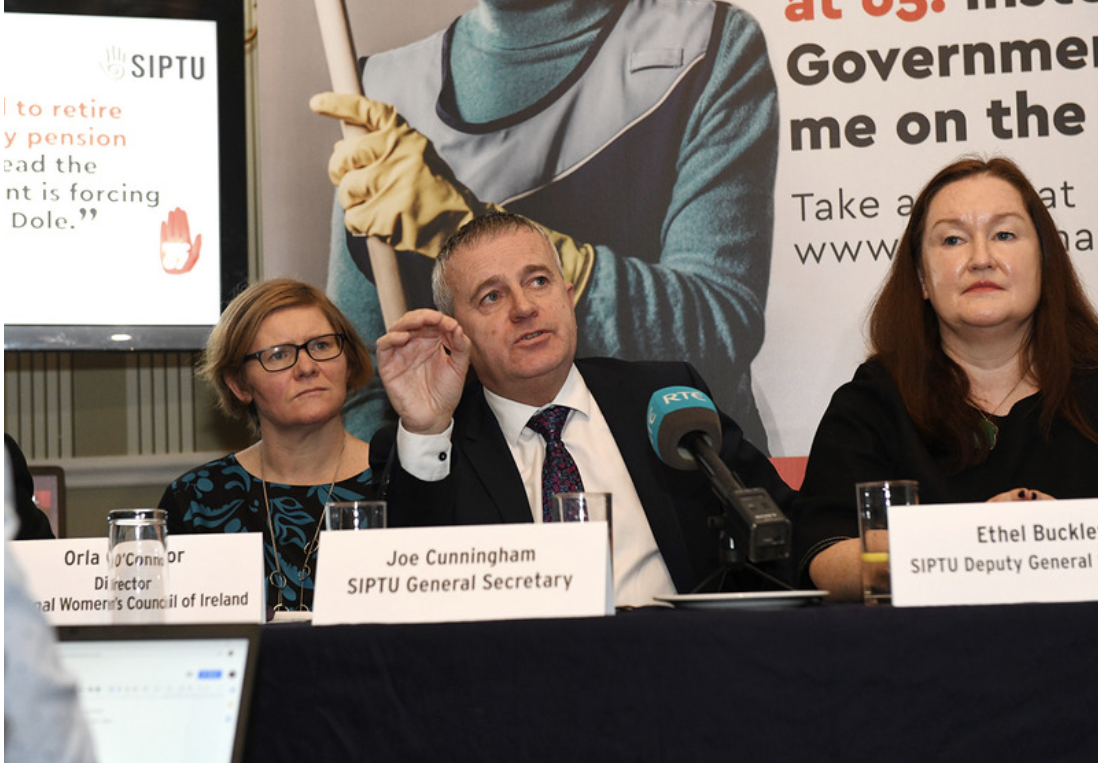Representatives of public service unions and employers have agreed proposals for a two-year agreement to succeed the Public Service Stability Agreement (PSSA), which expires at the end of this month. The main elements of the proposed agreement were outlined by union negotiators at a meeting of the ICTU Public Services Committee (PSC) today (Friday) after negotiations at the Workplace Relations Commission (WRC) concluded in the early hours of this morning.
The team of four ICTU negotiators told the meeting that Building Momentum: A New Public Sector Agreement represented a positive short-term package, negotiated against a difficult background, to build on the momentum of recent pay restoration and public service flexibility and service quality.
They said the package, which would run from 1st January 2021 until 31st December 2022 if ratified, was substantially weighted towards lower-income civil and public servants, and had achieved solid progress on the three priorities set by the PSC at the outset of the talks. These were (1) a mechanism to address issues outstanding from the Haddington Road agreement, (2) a separate mechanism to address sectoral issues, and (3) a realistic and acceptable approach to pay.
Each of the public service unions affiliated to ICTU, which represents over 90% of public servants, will now give the proposals detailed consideration before putting the package to their members.
The main features of the proposals include:
Pay
- A general round increase worth 1% of gross pay or €500 a year, whichever is the greater, on 1st October 2021. This means those on lower incomes will receive a significantly larger percentage increase than higher paid staff.
- A second general round increase worth 1% of gross pay or €500 a year, whichever is the greater on 1st October 2022. This means those on lower incomes will receive a significantly larger percentage increase than higher paid staff.
- Provision for the equivalent of a 1% increase in annualised basic salaries through a ‘sectoral bargaining fund’ (see below) on 1st February 2022.
Issues outstanding from the 2013 Haddington Road agreement
- Recognition that certain measures introduced under the Haddington Road agreement (HRA) “are to be addressed and implemented” including:
- The establishment of an independent body by the end of March 2021, to make recommendations to begin the process of returning to pre-Haddington Road hours, with €150 million available to commence implementation of the outcome during 2022, and provision for a successor agreement to engage on the roll-out of additional recommendations.
- A resolution of the new entrant teacher issue, which will see those recruited since 1st January 2011 move from point 11 to point 13 of the pay scale, or move up one additional point.
- Restoration of overtime and premium payments to pre-2013 levels.
Sectoral bargaining
- The establishment of a ‘sectoral bargaining fund,’ initially worth 1% of basic pensionable pay during the lifetime of the agreement, to deal with outstanding adjudications, recommendations, awards and claims, with the option for groups to use the available allocation as a sectoral pay round.
- The proposals outline how the ‘sectoral bargaining fund’ would operate, including an implementation process and compliance with “the maintenance of industrial peace.”
Maintaining the momentum for reform
- The proposals acknowledge the recent “unprecedented display of commitment, flexibility, hard work and agility in public service provision” and pledge the parties to harness this momentum to meet the immediate challenges of 2021 and 2022 including the continuing response to Covid-19, a return to normal delivery of health services, ensuring that schools remain open and addressing challenges that arose for children during the crisis, managing the response to Brexit, establishing the public service as the driver of best practice on remote working, and addressing digitisation.
- The package sets out measures to harness the potential for technology to improve service delivery.
- The package sets out measures to improve access to services through reformed work practices, including enabling temporary reassignments where necessary and increasing the movement of staff across the public service where necessary.
- The package sets out an implementation and reporting mechanism to ensure delivery of agreed reforms, including through sectoral action plans.
Outsourcing
- The agreement retains existing safeguards on any proposed outsourcing of public service provision.
Service stability and industrial peace
- The agreement sets out a detailed dispute resolution process, including an “industrial peace” clause in line with previous public service agreements.
- There is provision to review the terms of the agreement “where the underlying assumptions of the agreement need to be revisited.”
Speaking after this morning’s meeting, the chair of the PSC, Kevin Callinan, said the proposals were the best outcome that could be achieved over the relatively short lifetime of the proposed deal.
“This agreement builds on recent momentum to improve our public services and the lives of those who depend on and deliver them. The pay terms represent a realistic and acceptable approach to incomes, and they are substantially skewed towards lower earners in a very challenging context of limited resources.
“The ICTU team has also achieved a process to address sectoral issues, and a separate mechanism that will make real and substantial progress on the issues outstanding from the Haddington Road agreement, including its introduction of longer working hours that fell most heavily on women workers,” he said.
The PSC represents all ICTU-affiliated unions with members working in the civil and public service. Its officers, and lead negotiators, are Fórsa General Secretary Kevin Callinan, SIPTU Deputy General Secretary John King, INMO General Secretary Phil Ni Sheaghdha, and INTO General Secretary John Boyle.
The PSC is to meet again early next week to consider the detail of the proposals. Each of the PSC unions is then expected to consult their members on the package.
SIPTU Deputy General Secretary, John King, also welcomed the proposals which will be considered by the National Executive Council (NEC) of the union and then go to a secret, postal ballot of all members in the public service.
“Following three weeks of negotiation, we have emerged with a set of proposals that we believe is the best that can be achieved for our members in the current circumstances. In particular, they continue the process of income progression for the lower paid and middle income workers in the public service and the return of hours removed under previous agreements. The detailed proposals will now be considered by the NEC of SIPTU before it goes to a postal ballot of members,” he said.





